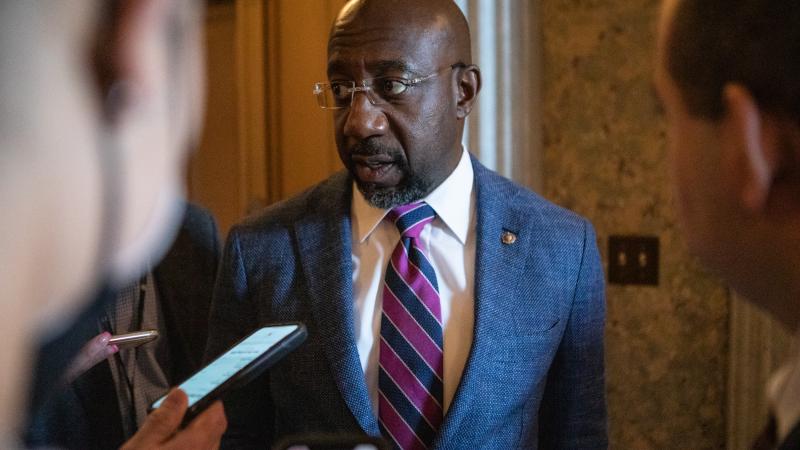Pennsylvania GOP nominee Mastriano sues Jan. 6 committee, alleges subpoena legally defective
Suit says Democrat-led committee violated Pelosi's own rules by not having ranking member, questions validity of chairman's signature on subpoena.
In an extraordinary legal strike two months before mid-term elections, the Republican nominee for Pennsylvania governor on Thursday sued House Speaker Nancy Pelosi and the Democrat-run Jan. 6 committee in federal court, alleging it failed to follow its own rules and does not have the legal authority to compel him to testify.
The lawsuit filed by state Sen. Doug Mastriano says the Pelosi-led House failed to follow its own rules and ensure the Jan. 6 committee had a ranking Republican member and therefore can’t compel his deposition under the rules Congress set for itself.
The suit also challenges the validity of Chairman Bennie Thompson’s signature on Mastriano’s subpoena, providing evidence it may be an autopen signature generated by staff.
“The focus of this complaint is not the legitimacy of the Committee. Rather, it is the Committee’s absolute inability to legally compel deposition testimony in compliance with the Regulations for Use of Deposition Authority,” the suit filed in U.S. District Court in Washington D.C. argued. “A properly appointed Ranking Minority Member is necessary for a witness, such as Plaintiff, to avail himself of the protections afforded to him in the Rules on the Use of Deposition Authority.”
“The U.S. House of Representatives Select Committee to Investigate the January 6th Attack on the United States Capitol is unable to comply with the House Regulations for the Use of Deposition Authority and is therefore unable to conduct a compelled deposition of the Plaintiff, or any other witness who does not consent to being deposed,” it added.
To back his argument, Mastriano’s lawyer Timothy Parlatore provided a letter from House Republican Leader Kevin McCarthy stating Democrats are in violation of their rules and cited a 1978 court ruling that congressional subpoenas are enforceable only when the committees “conform strictly to the resolution establishing its investigatory powers.”
Mastriano, a state senator backed by Donald Trump, won the GOP nomination for governor and is facing Democrat Attorney General Josh Shapiro in November. Mastriano was subpoenaed earlier this year by the committee over his efforts to investigate election irregularities in his state during the 2020 election.
The complaint laid out conversations – some in colorful detail – that Mastriano’s legal team held with the committee in an effort to reach a negotiated deal to testify. It alleges Democrats would not agree to Mastriano’s requests that any deposition be transparent to avoid Democrats cherry-picking information and leaks to influence the election.
“Because Plaintiff is currently the Republican nominee for Governor of the Commonwealth of Pennsylvania, he asked the Committee to agree to certain prophylactic measures that would ensure that his participation would not run the risk of improperly influencing the Pennsylvania state election,” the lawsuit said.
“Unfortunately, the Committee refused to negotiate any terms of a voluntary interview that would prevent them from improperly influencing the election, thus necessitating this litigation,” it added.
The suit also relays details of an attempt to start a deposition this summer in which Democrats allegedly became angry when Mastriano’s lawyers questioned Thompson’s signature on the deposition.
“Counsel for the Plaintiff inquired as to whether the subpoena had actually been issued by the Chairman, as required. This inquiry was prompted after noticing that the signature on the August 8, 2022 letter was absolutely identical to the one on the subpoena itself,” the suit said.
“When the question was asked whether the Chairman had issued the subpoena or if a staffer had instead issued it using an autopen, the Committee representatives became upset and refused to answer, thus increasing suspicions that Chairman Thompson did not issue the subpoena or the letter,” it added.
The suit includes pictures of the signatures showing they were identical.
The suit said after the two sides argued over the ranking member issue, Democrats tried to forcibly start the deposition but forgot one key step.
“Oddly, a representative of the Committee then proceeded to start asking Plaintiff questions. When asked by counsel for Plaintiff what he was doing, the representative announced that the deposition had commenced and that Plaintiff was not permitted to leave while a deposition question was pending,” the suit related. “Counsel for the Plaintiff then reminded the representative for the Committee that ordinarily deposition questioning cannot commence until after a witness was sworn – something that had not occurred.”
Parlatore successfully represented another witness in the Jan. 6 committee probe, former NYPD Commissioner Bernard Kerik, and ended up winning an apology when the committee falsely accused Kerik of attending a Jan. 5 meeting in Washington D.C. to discuss blocking certification of the 2020 vote. In fact, toll and phone records show Kerik was in New York City.
The suit asks the court to make a “declaratory judgment that Plaintiff is not required to sit for a compelled deposition” and to order Congress to pay Mastriano’s legal bills.















